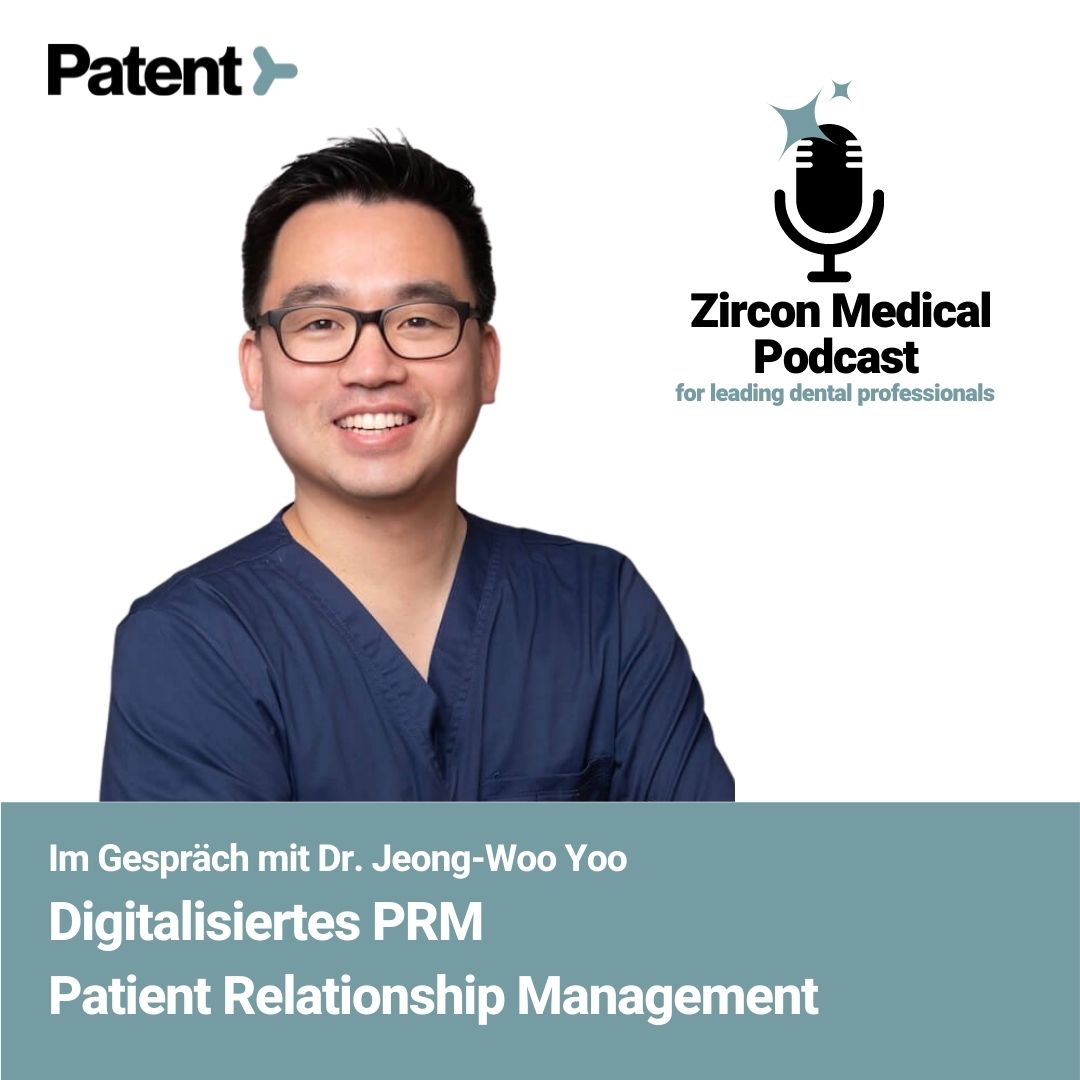
Introducing Dr. Jeong-Woo Yoo, the founder of Smilezone in Zug, Switzerland
Recent changes in the patient-dentist relationship
The importance of developing patient-centered aggregate platforms for dental clinics
The public interest in Jameda, a ratings portal for dental clinics and healthcare providers
The chat function can boost patient engagement
Automating chat responses and search queries
The challenges of existing PMS
Understanding the nocebo effect in a patient’s experience
Dr. Jeong-Woo Yoo
Founder of Smilezone in Zug, Switzerland
Studied dentistry at the University of Ulm
Founder and leading dentist at the Smilezone practice
Specializing in implantology, digital dentistry, and functional diagnostics
Location:Bahnhofstrasse 32, CH-6300 Zug
Website: https://www.smilezone-zug.ch/
Instagram: https://www.instagram.com/smilezonezug/
Facebook: https://www.facebook.com/zugsmilezone/
LinkedIn: https://www.linkedin.com/in/jeong-woo-yoo-383429113/
Bahnhofstrasse 32, 6300 Zug, Switzerland
In Conversation with Dr. Jeong-Woo Yoo
Patient relationship plays an extremely important role in dental practices, both economically and medically. Because of technologically-driven changes in consumer behaviors across all verticals, the relationship between dentists and patients has also changed. Dental clinics must use digital solutions to improve their patient relationships and management instead of relying on antiquated or dated methods. Our Zircon Medical Podcast recently hosted Dr. Jeong-Woo Yoo, the founder and leading dentist at Smilezonein Zug, to discuss the importance of patient relationship management in dental clinics.
Introducing Dr. Jeong-Woo Yoo, the founder of Smilezone in Zug, Switzerland
Dr. Jeong-Woo Yoo completed his dental studies at the University of Ulm, following which he specialized in implantology, digital dentistry, and functional diagnostics. He is the founder and leading dentist at Smilezone, a dental practice in Zug, Switzerland. Dr. Yoo says he had initially studied business administration in Korea. Everyone had to complete compulsory military service in Korea for 28 months, following which he decided to pursue dentistry. He focused on dentistry because he wanted the independence to do whatever he wanted.
Recent changes in the patient-dentist relationship
Dr. Yoo says the patient-dentist relationship has dramatically changed over the past decade. In the past, patients looked in the yellow pages to find nearby dental clinics, following which they sat for extended periods in waiting rooms for an appointment. But just as consumer expectations in other aspects of life have changed, such as transportation, hotels, and holidays, so too have patient expectations changed in relation to dentistry. Patients actively search for information and dentists based on testimonials and reviews — just as they choose restaurants and flights.
Dr. Yoo returns to the analogy of a holiday. When planning a vacation, an individual looks at pictures of the chosen locations, hotels, star ratings, costs, and other points of comparison between different hotels. Patients now choose dental services in a similar manner. Instead of simply visiting any dentist, patients actively look for dentists serving the specialties they require, and they go through online reviews, testimonials, websites, and much more. Dental clinics must respond to that change by sticking out and making their dental clinics accessible to patients.
The importance of developing patient-centered aggregate platforms for dental clinics
Dr. Yoo says the dental industry is yet to capitalize upon the opportunities presented by digital solutions. Patient behaviors have changed enough that they rely on online sources to find dental clinics. But currently, there are no platforms that can parallel the value offered by booking.com or AirBnb for the hospitality industry. If patients want to find information about dental clinics, they don’t have a single platform that can access an aggregate of information from multiple dental clinics, including their reviews, services, cost, and the ability to schedule appointments.
It’s harder to develop an aggregate platform for dentists and dental practices because different dentists offer different treatments. For example, a patient with a missing tooth won’t necessarily visit an orthodontic clinic, even if it has 5 stars. That means online platforms must be adapted to help patients identify clinics offering extremely specific services, complete with comparisons to other clinics offering similar services. Such an aggregate platform will allow patients to leave reviews for their dental clinics, which will serve as social proof of their skills and expertise.
Dr. Yoo likened the functioning of an aggregate platform for dental clinics to e-commerce platforms. The online shopping platforms that have higher conversion rates also sell more to their customers, which, in turn, helps them get even more conversions. The platform must also have mechanisms in place to ensure equal rights for the dentists, providers, and customers, which would prevent customers from leaving unfair reviews for their dentists. Dental clinics must invest in these early relationships with potential patients.
The public interest in Jameda, a ratings portal for dental clinics and healthcare providers
While discussing the importance of an aggregator tool, Dr. Yoo touches upon the Federal Court of Justice’s ruling on the Jameda platform, which garnered massive public interest. Jameda is an upcoming ratings portal that allows dental clinics and dentists to be listed online, where they can be found by potential patients. Healthcare providers complained that a platform like Jameda would disadvantage those who don’t pay for the service or those who don’t want to be listed at all.
But Dr. Yoo argues that all dental clinics are already public and available in the phonebook. The Jameda platform simply makes it easier for patients to reach their dentists, and that ease of access should be protected.
The chat function can boost patient engagement
While discussing the importance of an aggregator tool, Dr. Yoo touches upon the Federal Court of Justice’s ruling on the Jameda platform, which garnered massive public interest. Jameda is an upcoming ratings portal that allows dental clinics and dentists to be listed online, where they can be found by potential patients. Healthcare providers complained that a platform like Jameda would disadvantage those who don’t pay for the service or those who don’t want to be listed at all.
Dr. Yoo says WhatsApp is also an excellent platform to stay connected with existing patients. He cited the example of a patient of his who was trapped in Mexico when the COVID-19 pandemic first occurred. Since he needed urgent dental treatment, the patient contacted him via WhatsApp to discuss the treatment recommendation from his dentist in Mexico. One of his patients had a similar concern when she was in Iran — she needed a cost estimate for her father’s OPPT. In these cases, Dr. Yoo can advise his patients via text, even if they’re in other countries.
Automating chat responses and search queries
Dr. Yoo says that most patients ask the same set of questions during their consultations. The questions are the same as those that patients ask Google, such as the cost of a root canal or the cost of a dental implant. A patient relationship management tool can automate search queries. Instead of answering the same questions again and again, AI can answer most of the patients’ questions. That won’t constitute a binding consultation, but most patients are happy with that solution.
Most patients contact dental clinics with logistical concerns, such as how to make an appointment, canceling appointments, rescheduling, cost information, and more. These questions are easily automated. There are no automated AI chatbots for dentists and patients, but some of the existing AI chatbots can be repurposed for dental clinics. Various booking platforms already have these means, but they need to be introduced in dentistry.
The challenges of existing PMS
Currently, patients must visit different platforms for different stages of their dental journey. They can visit Jameda or Google to learn about different dentists and dental clinics in their area, perform specializes searched to understand how they can manage different dental treatments, and use other platforms for booking appointments. But existing PMS solutions must advance even more to help patients. The ideal platform should inform patients about their oral health requirements, link them to practices, and help them book appointments.
Dr. Yoo says the PMS must also offer the patient a means to compare. If one dental clinic has 4.3 stars but accepts immediate appointments whereas another has 4.9 starts but doesn’t accept immediate appointments, the patient can determine the urgency of their needs and select the ideal dental clinic. A comprehensive rating system will further empower patients to demand better care and find dental clinics that are suitable for their requirements.
Understanding the nocebo effect in a patient’s experience
Dr. Yoo says a placebo nocebo effect often occurs between a dentist and a patient. When the dentist informs the patient that they might feel pain, the patient is more likely to experience pain. That’s why some studies have found that patients who read the package leaflets in waiting rooms are more likely to experience side effects of dental treatments. Under the Patient Protection Act, dentists must inform patients about the side effects of their treatments, but there should be some limits — in some cases, knowing all the possible side effects may increase the risk of nocebo side effects.
Dr. Yoo summarizes his podcast by saying that a positive relationship between a dentist and a patient, whether digital or analog, will undoubtedly lead to better results. Digital technologies can simply facilitate a better patient experience and communications. Dr. Jeong-Woo Yoo can be found at his Smilezone dental clinic at Bahnhofstrasse 32, CH-6300 Zug. You can also contact him through Instagram, Facebook, or LinkedIn, or you can listen to him on our Zircon Medical Podcast.











